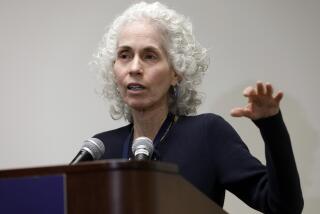Experts seek better health outcomes for homeless
- Share via
Years after facing patient dumping allegations and hefty legal settlements, Southern California hospital executives have begun working with advocates for the homeless to improve the health of homeless patients and to reduce their use of area hospitals.
Hospital administrators are driven by the national healthcare law, which offers incentives to provide better care at lower cost and imposes penalties when patients are unnecessarily readmitted to hospitals. Homeless patients are among the most frequent users of the region’s medical centers, often because they lack regular medical care.
Homeless patients stay in hospitals in Los Angeles County about four days longer on average than patients who aren’t homeless. The annual cost for homeless inpatient care in the region is $70 million, according to the county Department of Health Services.
On Monday, hospital administrators, lawyers, doctors and homeless service providers gathered in Los Angeles for a symposium organized by the pro-bono law firm Public Counsel. They discussed how to use technology, outpatient clinics, transitional housing and recuperative beds to change the way homeless patients are discharged after hospital stays.
Hernan Vera, the firm’s president and chief executive, said the healthcare law creates new opportunities for medical centers. “Hospitals have new financial imperatives and incentives under the Affordable Care Act to reduce readmissions and to link with outpatient services to manage chronic diseases,” he said.
Vera said the goal is to create a regional plan to reduce unnecessary readmissions among homeless patients, resulting in less costly, better care — and fewer cases of so-called patient dumping.
Over the last several years, law enforcement authorities in Los Angeles have cracked down on hospitals accused of dumping patients out on the streets. Several high-profile cases led to prosecutions, financial settlements, hospital policy changes and increased vigilance by homeless shelters.
Mark Song, a family practice physician from Kaiser’s South Bay Medical Center, said he attended Monday’s symposium to learn how to more seamlessly transition homeless patients into outpatient care — and keep them from needing to come to the hospital so frequently.
“It is not just our hospital,” he said. “At every hospital, homeless patients come in and out and overutilize our emergency departments.”
One of the best ways to reduce readmissions, advocates say, is to provide recuperative beds for patients, where they can recover from surgeries or hospital stays. There are only 48 such beds in the county, but the county is planning to open 120 more, said Yolanda Vera, a senior deputy for L.A. County Supervisor Mark Ridley-Thomas. L.A. County is also expanding housing for homeless residents and is opening health clinics specifically targeting them.
Charles B. Oppenheim, a healthcare lawyer, said hospitals also should consider coordinating more with skilled nursing facilities and employing staff to help patients comply with medication.
“The patient is a critical component of preventing readmissions,” he said.
More to Read
Sign up for Essential California
The most important California stories and recommendations in your inbox every morning.
You may occasionally receive promotional content from the Los Angeles Times.










